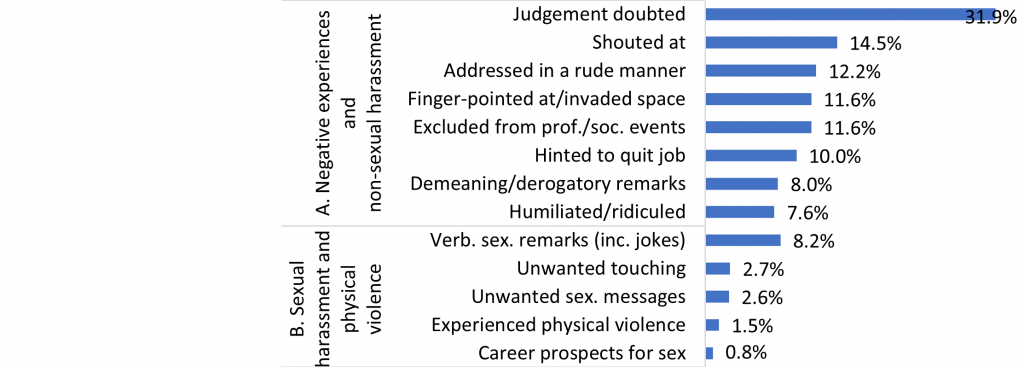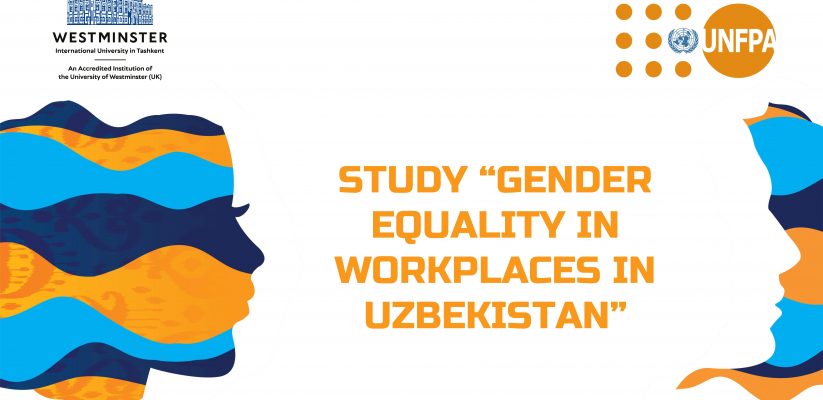Bakhrom Mirkasimov, Center for Policy Research & Outreach (CPRO) at Westminster International University in Tashkent, Uzbekistan.
Thus far, there has been limited research into the issues and perceptions of gender-based discrimination harassment in the private sector workplace in Uzbekistan.
To remedy this, the United Nations Population Fund (UNFPA) commissioned the Westminster International University in Tashkent (WIUT) to study gender equality in workplaces across different sectors in Uzbekistan. The study had two core objectives: To gather evidence on the perceptions, prevalence, and impact of gender-based inequalities, harassment, violence, and discrimination in the workplace in Uzbekistan’s private sector; and to understand the extent to which corporate policies and mechanisms can support gender-equality and inclusive work environments.
WIUT finalised the study and published the findings in both Uzbek and English in December 2022, and presented the final report in Tashkent.
The study employed a mixed research method. The qualitative segment involved in-depth interviews with 23 Human Resource (HR) managers of domestic and international businesses across Tashkent’s construction, IT, trade, manufacturing, food services, housing, education, and financial services sectors.
The quantitative segment collected primary data from 1,303 employees of the 23 private sector businesses through a questionnaire. Survey respondents were self-selected voluntarily to take part in the study. The respondents included 563 males and 740 females. Out of the total respondents, 65% were below age 34, 60% were married, over 58% were university graduates, and 54% were working in non-managerial positions.
Key Findings:
About 46% of female respondents reported negative work experience and non-sexual harassment, while 9% reported sexual harassment and 1.5% physical violence.
Figure 1: Incidents of negative work experience, GBV, and harassment female employees face

Incidents of physical violence and sexual harassment were reported more by women under the age of 24 (13%). In addition, respondents from national companies reported negative work experience and non-sexual harassment incidents more frequently (46%) than those in international companies (40%).
Many female respondents who faced negative work experiences, harassment, and violence reported feeling resentful towards the company (30%); and stressed and unwell as a result of the experience (25%). Only 58% of female victims of negative work experience and non-sexual harassment talked about it at work informally with colleagues. Significantly, the respondents indicated that talking about the incidents did not lead to any further action.
In terms of company HR policies, the in-depth interviews showed that cultural beliefs and traditional gender roles, demanding women to be sole caregivers, create barriers for women at work.
Most respondent employees took advantage of family-friendly HR policies (see Figure 2). The survey showed that remote and flexible working hours were the most frequently used benefits, followed by parental leave benefits. Comparatively, female respondents took advantage of such benefits more than their male counterparts, 44% and 30% respectively for remote working, and 37% and 27% respectively, for flexible working hours.

Gender based differences between managers’ attitudes toward employees’ requests for flexible working schedules were also noted (see Figure 3). Male line managers tend to be less understanding of such requests (i44%) compared to female managers (58%). This was especially true of requests made by female employees.
Both male and female managers tend to be more understanding towards requests from male employees. Similar findings were discovered for requests to work remotely and for absence from work by employees due to dependent care.
Figure 3. Attitudes of managers toward requests for flexible work schedules to meet family obligations

Note: N (Males reporting to male managers) = 422; N (Males reporting to female managers) = 111; N (Females reporting to male managers) = 492; N (Females reporting to female managers) = 212.
In terms of hiring and promotion, company HR managers claim to follow a gender-neutral hiring process, while simultaneously noting three challenges for hiring women: Reluctance from managers to hire women because of their role as caregivers; gender stereotypes in assigning male and female jobs limiting female applicants; and types of work requiring physical strength and staying late hours. Only five out of 23 companies explicitly indicated following a gender-equality HR policy, such as gender diversity targets and gender-neutral job hiring panels.
Women are under-represented in management, with some companies admitting the absence of women in top management roles. About 74% of the respondents’ line managers are men. In this regard, a company HR indicated that most senior managers prefer working with men to women
Acknowledgements
The blog benefited from the study report on ‘Gender Equality in Workplaces in Uzbekistan ’ financially supported by the UNFPA (the United Nations Population Fund) and implemented by the Center for Policy Research & Outreach (CPRO) at the Westminster International University in Tashkent (WIUT).
The full report is available at: https://bit.ly/3j8sydv
Disclaimer
UNFPA does not guarantee the accuracy, reliability, or completeness of the content included in this policy brief and accepts no responsibility or liability for any omissions or errors. The findings, interpretations, views, conclusions, and recommendations of the study, as contained in this publication, reflect the author’s views and do not necessarily reflect the official opinion of UNFPA.
